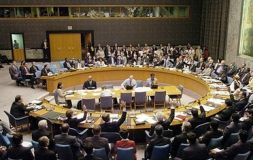Security Council debates Darfur, Sudan boycotts
Aug 28, 2006 (UNITED NATIONS) — The Security Council debated the deteriorating situation in Darfur as Washington vowed to press for UN peacekeepers to be deployed in Sudan’s war-torn western region despite Khartoum’s opposition.
 The closed-door meeting was boycotted by Sudan, whose government rejected US pressure to accept a US-British draft resolution calling for the deployment of UN troops.
The closed-door meeting was boycotted by Sudan, whose government rejected US pressure to accept a US-British draft resolution calling for the deployment of UN troops.
The proposed 17,000-strong force would take over from the ill-equipped and under-funded African Union (AU) mission, which has proved unable to prevent killings, rape and internal displacement of civilians in the region.
Monday’s meeting of the 15-member council was also attended by representatives of the African Union, the Arab League and the Organization of the Islamic Conference.
But the Sudanese government, which had also been invited, did not participate, an absence which US Ambassador to the United Nations John Bolton called “disappointing to say the least.”
Warning that the situation risks getting out of control in Darfur amid fears of a government offensive against rebels, Bolton said Washington and London would press for a vote on their draft before the end of the month.
“It is time for action. It is time for this Council to uphold its responsibility and pass a resolution immediately authorizing the deployment of UN forces,” he told the council.
“The sticking point is how to handle consent by the government of Sudan,” he later told reporters, making it clear that the UN peacekeepers had no intention of forcing their way into Darfur.
The deployment of UN peacekeepers is seen as crucial to bolstering a fragile Darfur peace deal signed in May and preventing further bloodshed.
Meanwhile US Assistant Secretary of State Jendayi Frazer, who travelled to Khartoum to win over the Sudanese government, was not able to see Sudanese President Omar al-Beshir.
But she was handed a letter for US President George W. Bush in which the Sudanese leader reiterated his firm opposition to the UN troop deployment.
The State Department however said Monday that Frazer might extend her visit to Sudan to meet Beshir.
Frazer “has not yet met with president Beshir. She met with other senior officials, including the foreign minister, and she is still hopeful — we are still hopeful — that she will meet with president Beshir,” State Department spokesman Sean McCormack said.
“She plans to go to Stockholm” for a contact group meeting Tuesday on Somalia “but she also has a mission in Sudan that she wants to accomplish. She is a pretty determined person,” the spokesman added.
Frazer’s last-ditch mission to Sudan got off to a bad start Saturday when she was greeted at the airport by shouts of “Go Home” as an angry mob tried to cover her vehicle with anti-US banners.
Before leaving Washington, Frazer warned of a massive military buildup in Darfur, where fighting and famine have left 300,000 people dead and 2.5 million homeless in three and half years.
Earlier Monday Rick Grenell, a spokesman for the US mission to the United Nations, accused China of blocking progress on the deployment of the UN force.
“The country that is showing the most interest in making sure that we don’t move forward on the issue (of Sudan) is China,” he added.
China, a veto-wielding permanent member of the council which has close energy ties with Khartoum, and a couple of African countries on the council “don’t view Sudan as a priority”, Grenell added.
Ghana’s UN Ambassador Nana Effah-Apenteng, the council president for August, said his country was prepared to support the draft. The other two African members of the council are Congo and Tanazania.
Bolton said the council’s five veto-wielding permanent members — Britain, China, France, Russia and the United States — would meet shortly “to see if we can find a way through this, hoping for a vote in a couple of days”.
The council also discussed Beshir’s alternative plan to deploy 10,500 Sudanese government troops by early January to provide security in Darfur.
Washington accuses Sudanese government troops and their proxy Janjaweed militia of genocide over their fierce repression of the uprising launched by ethnic minority rebels in February 2003.
Council members were also briefed on the latest Darfur developments by top UN officials in charge of peacekeeping and humanitarian affairs.
Jan Egeland, the UN relief aid coordinator, said he gave the council his “bleakest account of conditions in Darfur since the spring of 2004.”
“Our entire humanitarian operation in Darfur — the only lifeline for more than three million people — is presently at risk,” he told the council.
“We need immediate action on the political front to avoid a humanitarian catastrophe with massive loss of life,” he added. “If the humanitarian operation were to collapse, we could see hundreds of thousands of deaths.”
Beshir has repeatedly accused Washington and other Western powers of furthering imperialist plans in Darfur and the recent Israeli offensive in Lebanon only appeared to consolidate his opposition to a UN deployment.
Decades of ethnic tensions in Darfur erupted into all-out violence in 2003 when ethnic minorities took up arms against the Arab-dominated government in Khartoum to fight for autonomy and a greater share of the region’s resources.
(AFP/ST)
